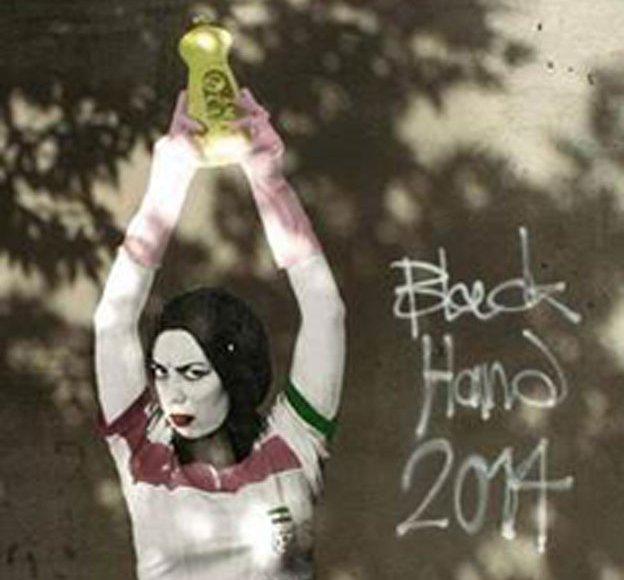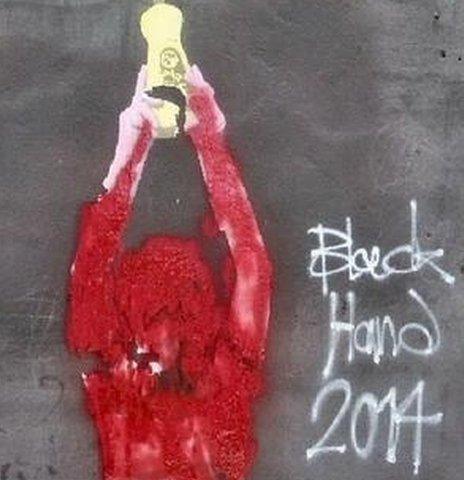#BBCtrending: Iran's washing-up liquid protest
- Published

A striking piece of graffiti in the heart of Iran's capital Tehran has been widely shared on social media. It shows a woman holding up a "World Cup" in the shape of a washing-up liquid bottle. What does it mean and why has it struck a chord?
Black Hand is sometimes referred to as "Iran's Banksy". It's unclear whether it's a man, a woman, or a group of artists behind the work, but the graffiti keeps springing up around the Iranian capital.
And one Saturday morning at the end of June, Tehranis woke up to the image of a woman in the national team kit, holding aloft in her soapy gloved hands a bottle of washing-up liquid. The image has been captured and shared thousands of times on Facebook, Twitter and Instagram - not only because of its prominent positioning in the main street in Tehran, Vali Asr, but also because it clearly struck a nerve.
"Every morning, I get up and one of the first things I do is log onto my Facebook… and as soon as I went in, this image was all over my feed," says @Pedestrian, an Iranian student who lives between the US and Iran and who does not want us to use her real name. "I think it was a timely piece of art. It brought the World Cup, the stadium issue and the feeling of being a woman in Iran together."
As we've reported on this blog before, despite repeated protests, women have long been banned from watching football matches in stadiums. In 2012, that ban was extended to volleyball games too - and with the World League currently under way, many Iranians are not happy.
Listen to BBC Trending radio
"It's very cruel, it's unbelievably cruel. Why would you not let them in?" says Sarah Ahari, who played basketball for Iran's national team for three years and works for Small Media, which aims to improve the flow of information between Iran and the rest of the world. "Imagine, Iran is competing in Tehran, and Brazilians and Italians can bring their wives into the stadiums. And Iranians cannot. And you are hosting the match."
As elsewhere in the world, graffiti is illegal in Iran, and the original version of the woman with her washing-up liquid bottle was soon painted over in red paint. Some say it was by the state - others speculate it could have been done by Black Hand, as a further artistic gesture. Eventually it was buffed out completely.

But the image lives on in social media and is still being shared. "Street art is always political. It's in the street, talking with the people for the people," says SOT - one half of the Iranian graffiti team ICY and SOT who now live in the US.
"It's good that through social media everyone could see that. Some people maybe didn't have any idea about what's happening with women and sport in Iran. But maybe after seeing that piece they'll go and search and find out what's going on there. It's very important."
Reporting by India Rakusen, external
You can follow BBC Trending on Twitter @BBCtrending, external
All our stories are at bbc.com/trending